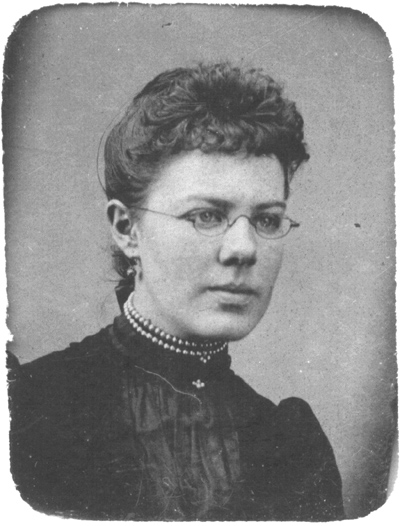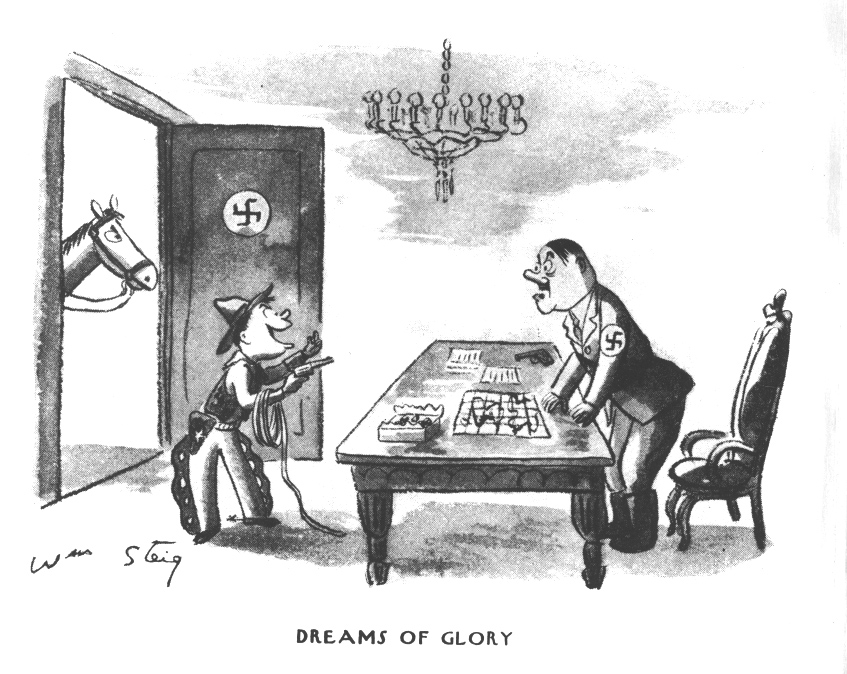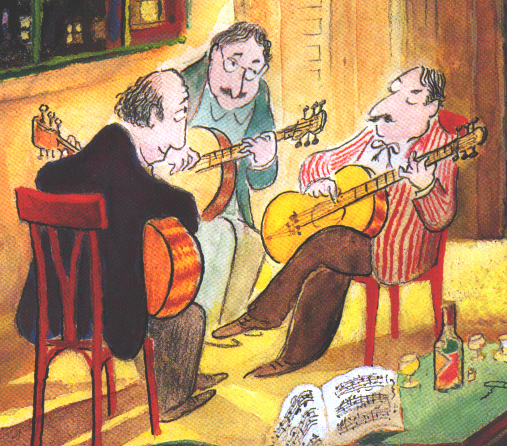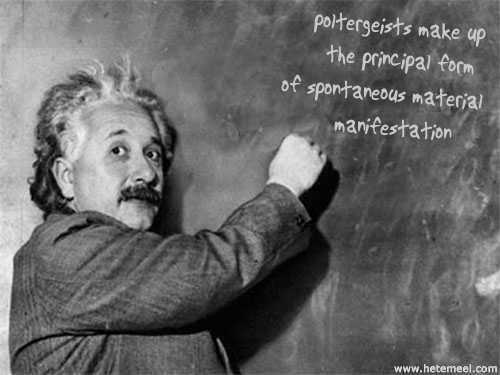March 31, 2006
March 30, 2006
March 28, 2006
March 27, 2006
Sea level
Nothing quite like a clever visualization to focus the attention. this map, centered on Horton Landing Nova Scotia (where our house is) shows the area that would be inundated by a 7m rise in sealevel. Wonderful example of the power of mashups, in this case simply Google maps and elevation data.
The Common Toad
My friend Ron sent this wonderful bit of George Orwell, in celebration of the Spring:
...I have always suspected that if our economic and political problems are ever really solved, life will become simpler instead of more complex, and that the sort of pleasure one gets from finding the first primrose will loom larger than the sort of pleasure one gets from eating an ice to the tune of a Wurlitzer. I think that by retaining one’s childhood love of such things as trees, fishes, butterflies and-to return to my first instance-toads, one makes a peaceful and decent future a little more probable, and that by preaching the doctrine that nothing is to be admired except steel and concrete, one merely makes it a little surer that human beings will have no outlet for their surplus energy except in hatred and leader worship.At any rate, spring is here, even in London N.1, and they can’t stop you enjoying it. This is a satisfying reflection. How many a time have I stood watching the toads mating, or a pair of hares having a boxing match in the young corn, and thought of all the important persons who would stop me enjoying this if they could. But luckily they can’t. So long as you are not actually ill, hungry, frightened or immured in a prison or a holiday camp, spring is still spring. The atom bombs are piling up in the factories, the police are prowling through the cities, the lies are streaming from the loudspeakers, but the earth is still going round the sun, and neither the dictators nor the bureaucrats, deeply as they disapprove of the process, are able to prevent it.
-- "Some Thoughts on the Common Toad," 1946
links for 2006-03-27
-
(highlight a word or phrase, execute searches and other smooth moves)
March 26, 2006
Mandocello improv
I've been messing with the means to record from various sources, working out efficent ways to move stuff from vinyl and cassette tapes to digital form. It occurred to me that I could run pretty much anything from my Mackie mixer into the iRiver iFP-700, so I recorded about 4 minutes of a nameless something played on my Dell'Arte mandocello. It might have something to do with the crocus shoots that are beginning to peek through the dirt.
a few minutes later: there's a problem with the integral player (that blue triangle), such that it plays back at double speed... not what I intended. Click on the hyperlink instead, to play the clip at the right speed. I'll try to figure out what's going on...
still later: I think I see what went wrong. The default rate for the iRiver mode I was using is 32 kHz, but the playback thinks it should be 44 kHz. Elementary mistake by ignorant user...
March 24, 2006
links for 2006-03-24
-
The Articulations of Place in the Voyages of Captain Cook ( Brian Richardson's dissertation, 2001)
March 23, 2006
March 20, 2006
links for 2006-03-20
-
"information about nearly 1,500 early gothic buildings in Northern France drawing on the work of Dr. John James."
-
map of spread, 2004-2006
March 18, 2006
Derek Smalls in New Guinea
Ah, in-jokes: this one from the splendid Language Log.
Bruce Sterling in 13 gulps
Every year Bruce Sterling gives a talk (well, a rant) at SXSW, and this year's is a real barn-burner. The whole thing is available for download (along with quite a few other recordings of panels), and it's really worth listening and then listening again to the whole 48 minutes. That's a pretty tall order for people who don't have mp3 players grafted into their lives, and long commutes or walks or whatever in which to multitask.
To give you reasons to download the whole thing, I've made a bunch of extracts of especially powerful bits, most of them pretty short:
American industrial policy 0:12This is heady stuff, and his reading of Sandberg (which ended the talk --I mean, how could you follow that?) makes the point pretty persuasively that hearing a poem is an essential complement to reading a poem silently. See also Jon Lebkowsky's take at WorldChanging.
broadband in Serbia 0:21
technical backwardness 0:55
the last reels of Gone With the Wind 1:10
on Creationism 0:50
the ports scandal 0:25
where are Mladic and Karadzic? 0:48
quoting Warren Ellis 1:00
on spimes 6:00
the Semantic Web 2:20
the people tire... 0:20
Evil has a face 1:20
reading part of Sandberg's The People Yes 2:40
March 16, 2006
reading Clive Bell
One of the pleasures of midcoast Maine is odd finds in used bookstores. One recent example: Clive Bell's Old Friends, a collection of sketches published when he was about 75, looking back over a life of having known remarkable people. Three excerpts, chosen for their vivid language:
of Dugardier's model, Irma:
Besides being a beauty, Irma was a wit, and a très brave fille to boot. A passionate cyclist, she was the first woman wearing bloomers with whom I ever sat down to dine; also, she was the first I ever saw pick up her plate and lick it clean. I learned much from Irma. (pg 151)
on Walter Sickert:
'The opinions of Walter Sickert', what were they? They boxed the compass between a first and a third glass of wine. Sickert was a chameleon, and the most I hope to suggest is some plausible explanation of the fact.Sickert was a poseur: he belonged to an age of poseurs, the age of Wilde and Huysmans and Whistler. If, to be an artist, it was not absolutely necessary to épater les bourgeois, it was necessary to do so in order to be reckoned one in the best circles. And it was in the best artistic and intellectual circles that Sickert was admired. In London, at the beginning of the century, his position was remarkable and, I think, enviable. He was not a popular artist but he was esteemed. English people of intelligence and culture, whose culture was mildly cosmopolitan and more or less up to date, had to have an English painter to admire, and whom could they have but Sickert? (pp 13-14)
In an effort to describe Virginia Woolf's conversation ("the fun and spirit of Virginia's talk") he quotes this passage from The Mark on the Wall:
...To show how very little control of our possessions we have—what an accidental affair this living is after all our civilization—let me just count over a few of the things lost in one lifetime, beginning, for that seems always the most mysterious of losses—what cat would gnaw, what rat would nibble—three pale blue canisters of book-binding tools? Then there were the bird cages, the iron hoops, the steel skates, the Queen Anne coal-scuttle, the bagatelle board, the hand organ—all gone, and jewels, too. Opals and emeralds, they lie about the roots of turnips. What a scraping paring affair it is to be sure! The wonder is that I’ve any clothes on my back, that I sit surrounded by solid furniture at this moment. Why, if one wants to compare life to anything, one must liken it to being blown through the Tube at fifty miles an hour—landing at the other end without a single hairpin in one’s hair! Shot out at the feet of God entirely naked! Tumbling head over heels in the asphodel meadows like brown paper parcels pitched down a shoot in the post office! (pp 108-109)
March 14, 2006
March 13, 2006
Gem tintypes
I unearthed another trove of Nova Scotia Faces photographs, hidden in a box with an enigmatic label (that's what happens when you move) and rediscovered an album of what are technically called "gem" tintypes --about 0.75 x 1 inch, which is to say small enough that they are difficult to see. I'm scanning them at 1200 dpi and and applying some Photoshop magic to adjust the brightness and contrast, and I'm rewarded with astonishing portraits, like this one:
See others in the set
links for 2006-03-13
-
"an indispensable tool for the global newsjunkie" --but time horizon is a bit blurry, including stories from at least the last 3 months
March 12, 2006
Today's walk
About 3 miles, across the St. George Peninsula from Martinsville on the Atlantic side
to Turkey Cove on the St. George River
and back. Spring definitely out there somewhere.
March 11, 2006
Juicy invective
Kieran Healy twirls a stick in a Comments hornet's nest with his post which includes these bonbons:
...it is nevertheless an important fact that an elite French education can entail learning quite a lot of math in addition to ploughing through the great philosophers. So your typical Next Big French Intellectual often has the wherewithal to bug the shite out of technoids and comp-litters, although only one of these constituencies is typically targeted... The cafés at the Collège de France sell bottled reflexivity instead of Evian.
March 09, 2006
A Steig example
Come to think of it, everybody didn't grow up with The New Yorker Album 1925-1950, but I sure did. I can trace all sorts of fundamental bits of Weltanschauung (and probably basic sensayuma) to specific cartoons that I puzzled over for years before I learned/discovered what they were really about. There are great depths, largely unplumbed, in the stratigraphies and ontogeny of humor. William Steig is good and dead, so I don't feel that I'm somehow stealing from him or from the much-beloved New Yorker by putting this one up here. It might inspire a reader to buy the (foolishly DRM'd, but nonetheless utterly indispensable) Complete New Yorker:
I've always been especially charmed by the look on the horse's face.
Dreams of Glory

This bit of detail from this week's New Yorker cover (by Jean-Jacques Sempé) seems like it was drawn with my peculiar sensibilities in mind. It took me about 1.5 seconds to recognize that and for the well-known lump to generate in the throat, but none of the several generally-astute-and-knowledgeable people I've shown it to have had anything like my reaction. They (the g-a-&-k persons) aren't guitar players, but I wonder if the image is even more specifically targeted? It all hangs on (1) who the dude in the stripes is and (2) the precise placement of lines in the faces of the other two players.
There was a wonderful series of cartoons in the New Yorker in the 40s and 50s, captioned as Dreams of Glory, drawn by William Steig and depicting the fantasy lives of kids, who imagine themselves rescuing maidens from dragons or arresting Hitler with a cap gun... The two unstriped guitarists are the grownup versions of those kids. It's just paralyzingly obvious that (1) the stripy guy is Django Rinehardt (look at the left hand, but take in as well the insouciance of the posture), and (2) the event of Django coming over to play music is in the realm of glorious fantasy...
Anyway, Sempé really GOT me with this one.
links for 2006-03-09
-
uses Yahoo! Maps API to zoom to any of 20K US cities
March 06, 2006
Fantasy, and gaming?
Personally, I just don't get it with games and gaming, and I never have. Two kindsa people in the world, right? But here's a sentence from an essay on China Miéville that makes the light go on for a possible understanding of gaming-as-pedagogy:
...fantasy should become a way of arguing about our social condition, of re-presenting our dilemmas, and creating a space for the imagination in which we can identify new possibilities of action.
Henry Farrell, Fantasy Remade: China Miéville’s New Crobuzon novels
Here's why Language Log is indispensable
I lead a sheltered life here in Splendid Otium ME 04860, and without Language Log I suspect I'd never have encountered The Eggcorn Database. Etymology:
In September 2003, Mark Liberman reported (Egg corns: folk etymology, malapropism, mondegreen, ???) an incorrect yet particularly suggestive creation: someone had written “egg corn” instead of “acorn”. It turned out that there was no established label for this type of non-standard reshaping. Erroneous as it may be, the substitution involved more than just ignorance: an acorn is more or less shaped like an egg; and it is a seed, just like grains of corn. So if you don’t know how acorn is spelled, egg corn actually makes sense.
And who knew that mondegreens were, well, mondegreens?
If your dictionary doesn't include "mondegreen," throw it out and buy a better one.The term "mondegreen" was coined by Sylvia Wright in a 1954 Atlantic article. As a child, young Sylvia had listened to a folk song that included the lines "They had slain the Earl of Moray/And Lady Mondegreen." As is customary with misheard lyrics, she didn't realize her mistake for years. The song was not about the tragic fate of Lady Mondegreen, but rather, the continuing plight of the good earl: "They had slain the Earl of Moray/And laid him on the green."
March 05, 2006
Victorian London
Diana Sinton points to Google Earth kmz file for Victorian London. Think of the possibilities...
Imminent Victorianism
Several odd twists of interests (and via Richard D. Altick's Victorian People and Ideas: A Companion for the Modern Reader of Victorian Literature) led me to a reading of Lytton Strachey's Eminent Victorians, a book I've owned at least once but hadn't actually read. What a treat, what a wonderful romp through pecksniffianreligious manias and backstage politics of power. And how very a propos to culture wars of the present, in which a lot of the same cant is dressed up in new duds.
It's difficult to select among the passages that might inspire you to read it (or read it again) for yourself, but I think this one is among the most inspired bits of naughtiness:
The Oxford Movement was now ended. The University breathed such a sigh of relief as usually follows the difficult expulsion of a hard piece of matter from a living organism, and actually began to attend to education. As for the Church of England, she had tasted blood, and it was clear that she would never again be content with a vegetable diet. Her clergy, however, maintained their reputation for judicious compromise, for they followed Newman up to the very point beyond which his conclusions were logical, and, while they intoned, confessed, swung incense, and burned candles with the exhilaration of converts, they yet managed to do so with a subtle nuance which showed that they had nothing to do with Rome. Various individuals underwent more violent changes. Several had preceded Newman into the Roman fold; among others an unhappy Mr. Sibthorpe, who subsequently changed his mind, and returned to the Church of his fathers, and then-- perhaps it was only natural-- changed his mind again. Many more followed Newman, and Dr. Wiseman was particularly pleased by the conversion of a Mr. Morris, who, as he said, was 'the author of the essay, which won the prize on the best method of proving Christianity to the Hindus'. Hurrell Froude had died before Newman had read the fatal article on St. Augustine; but his brother, James Anthony, together with Arthur Clough, the poet, went through an experience which was more distressing in those days than it has since become; they lost their faith. With this difference, however, that while in Froude's case the loss of his faith turned out to be rather like the loss of a heavy portmanteau, which one afterwards discovers to have been full of old rags and brickbats, Clough was made so uneasy by the loss of his that he went on looking for it everywhere as long as he lived; but somehow he never could find it. On the other hand, Keble and Pusey continued for the rest of their lives to dance in an exemplary manner upon the tight-rope of High Anglicanism; in such an exemplary manner, indeed, that the tightrope has its dancers still.
Since Eminent Victorians was first published in 1918, it's well out of the copyright stranglehold and so is available online. I do wish I could get my paws on Oxford U.P.'s new edition, with annotations. Their summary of the book's significance:
Lytton Strachey's biographical essays on four 'eminent Victorians' dropped a depth-charge on Victorian England when the book was published in 1918. It ushered in the modern biography and raised the genre to the level of high literary art. Lytton Strachey approached his subjects with scepticism rather than reverence, and his iconoclastic wit and engaging narratives thrilled as well as shocked his contemporaries. Debunking Church, Public School and Empire, his portraits of Cardinal Manning, Florence Nightingale, Dr Arnold of Rugby, and General Gordon of Khartoum changed perceptions of the Victorians for a generation.
Rural Maine isn't a particularly good locale for finding a book like Eminent Victorians, but Camden's ABCD Books had the Modern Library edition, complete with ca. 1955 dust jacket. Reading it in that clothing sure did take me back...
I've done some looking around for more or less current Web mentions of Eminent Victorians and found quite a few that enlarge on my own reading. One of the most useful is Martin Tulic's Index to Eminent Victorians, which inspires a whole different sort of reading of the text. Also useful is Lincoln Allison's posting ("Lincoln Allison has recently retired as Reader in Politics, University of Warwick. He is continuing his education by reading those classics he has previously neglected. His previous Retrospective Reviews can be read here").
Toby Litt's Cult Choice begins with this stirring sentence:
It would be an exaggeration, but only a slight one, to say that all contemporary non-fiction starts with Eminent Victorians...
And Paul Levy has a very nice piece in The Guardian (July 20, 2002): Rereadings: A string quartet in four movements ...which provides a lot of useful background to how the book came to be written, and concludes with this Stracheyan postscript:
The standard historian's complaint with the work has been that Strachey used only secondary sources, consulted no unpublished sources, and gave no references. Moreover, scholars have made specific complaints about the sources he did use. Modern scholarship holds that some of these objections are well-founded, others less so. But these are matters for specialists, providing them with gainful employment, and do not much affect the present-day reader's enjoyment of the book.
R J Keefe's Portico has a nice essay titled Victorians Immense, which characterizes Eminent Victorians as
a book that changed the shape of biography forever ...In Eminent Victorians, Strachey combines heavy irony with boy's-own-adventure writing to produce an account that can't be put down...
Yup, that says it pretty well.
If you've got this far in this posting and have a taste for deflation of hypocrisies, you deserve a reward. Here it is, thanks to a link in today's posting by Benjamin Zimmer on the absolutely essential Language Log: A Psalm of Montreal (Samuel Butler). Two delectable stanzas to convince you to read the whole thing:
"The Discobolus is put here because he is vulgar -
He has neither vest nor pants with which to cover his limbs;
I, Sir, am a person of most respectable connections -
My brother-in-law is haberdasher to Mr. Spurgeon."
O God! O Montreal!Then I said, "O brother-in-law to Mr. Spurgeon's haberdasher,
Who seasonest also the skins of Canadian owls,
Thou callest trousers 'pants', whereas I call them 'trousers',
Therefore thou art in hell-fire and may the Lord pity thee!"
O God! O Montreal!
